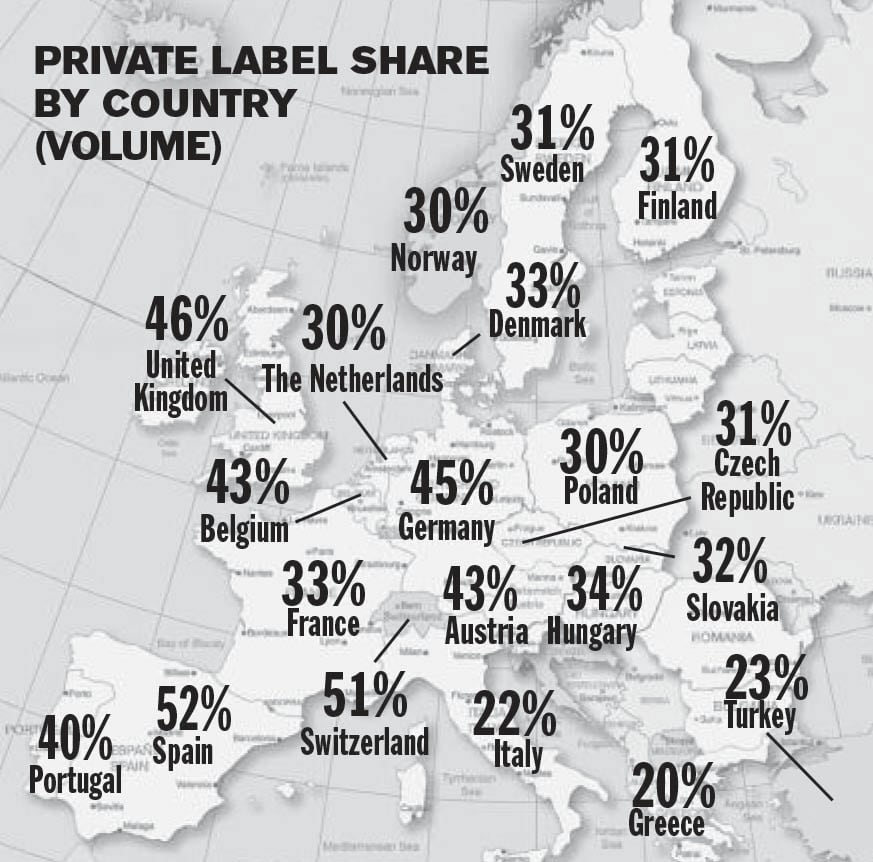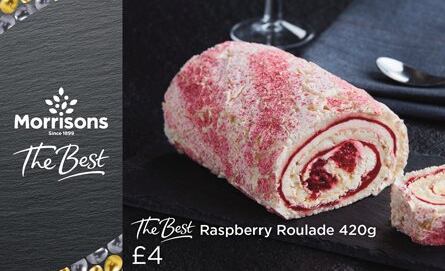Private label brands are strategically important for grocery chain operators in Europe. On the bottom line, they deliver a more appealing margin for retailers than national branded products. On the top line, private label ranges provide a point of difference to draw people in store and foster loyalty.
To consumers, store brand ranges have come to be associated with both price and quality.
“In the grocery segment, retailers with private-label products are attracting many customers who require better-quality products at affordable prices. This helps retailers drive their sales and get higher margins,” Technavio retail analyst Poonam Saini noted.
Between now and 2021, Technavio predicts that the European market for private label grocery products will see a compound annual growth rate (CAGR) of 7%. This is well above the overall growth rate expected for European food sales.
According to data from Statista, European food revenue is forecast to total €662.3bn in 2018 and the market is expected to see a CAGR of 2.1% to 2021.
Private label’s growing market share

Data from the Private Label Manufacturers Association International (PLMA) reveals that in Switzerland and Spain private label sales now account for over half of total grocery sales, at 51% and 52% of the market respectively.
In the UK, Germany, Belgium, Austria and Portugal private label sales sit north of the 40% mark.
For 15 of the 20 countries included in the PLMA’s data (pictured) the market share of private label exceeds 30%.
What is fuelling success?
Brian Sharoff, President of the PLMA, believes that the expansion of private label is not tied to economic pressures and the comparative low cost of products versus national brands.
“Private label’s success isn’t tied to economic cycles but reflects the growing confidence shoppers have in retailer brands,” he said.
Figures released today (24 April) by research firm Mintel support this conclusion. According to the group’s Global New Products Database, Europe accounted for 57% of private label product launches that carry premium claims in 2017. This compares to 22% of claims originating in North America and 16% hailing from the Asia Pacific region.
Overall, Mintel noted, only 11% of private label products globally carried a premium claim in the year – a fact that the researchers claimed showcases the “importance” of premium positioning in the European region.
“Private label has reached a new stage in evolution as consumers expect these products to be on a par with, or even surpass, the quality of national brands,” Mintel analyst Katya Witham said.
“Retailers are looking to upgrade their private label ranges as consumers shift from a purely low price approach to weighing a product's overall value proposition.”
While price is no longer the only reason why European shoppers opt for private label, Mintel’s investigation did find that it remains a key factor in purchase decision. Over seven in ten consumers in key European markets (80% of German, Italian and Spanish, 77% of French and 76% of Polish consumers) state that they compare prices between branded and own label products, Mintel revealed.
As UK grocery market share figures from Kantar Worldpanel demonstrate, private label has also become an important battleground for the comeback kids of European grocery. Many large mid-market supermarkets have found themselves squeezed by the high-growth German discounters, Aldi and Lidl, on the one hand and premium retailers, such as the UK's Waitrose, on the other.

For both Morrisons and Asda, an emphasis on private label development is starting to pay dividends. In the 12 weeks to the end of February, Morrisons was able to report its 16th consecutive period of growth, Kantar revealed.
Morrisons' premium private label range, The Best, was a key contributor to the overall performance, delivering a 20% rise in sales year-on-year. Interestingly, Morrisons is not only one of the UK's 'big four' retailers, it is also one of the country's largest food manufacturers, producing a volume of its private label lines.
Asda, meanwhile, was able to grow footfall in order to achieve its best sales performance since 2014. This was helped by a 6.4% increase in total own label sales. Significantly, just one year after its launch, the retailer’s Farm Stores range is now purchased by 30% of UK households while its Extra Special premium offering expanded sales by 19%.
“Private label is one of the main areas where retailers can create a point of differentiation and stand out in an increasingly competitive retail market. There are ample opportunities for retailers to use premiumisation to capitalise on shoppers’ increasingly sophisticated tastes and to redefine consumer retail brand expectations," Mintel’s Witham concluded.
This leaves private label manufacturers and their retail customers who leverage up-and-coming consumer trends poised to capitalise. "With conscious consumption going mainstream, premium private labels with provenance, heritage ingredients, and craft credentials can justify a higher price tag for many consumers."
